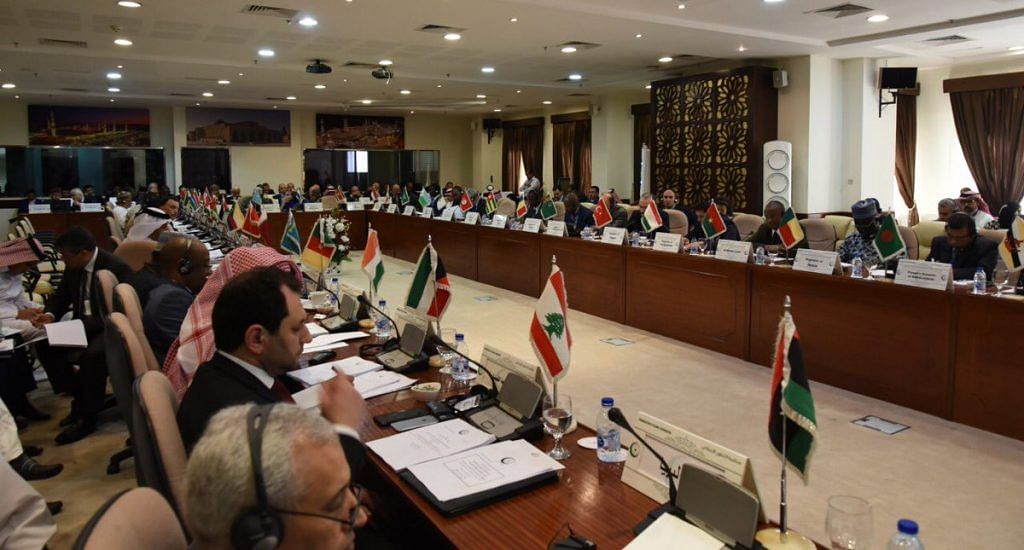New Delhi: In just under a year, the Organisation of Islamic Cooperation (OIC)’s ties with the Narendra Modi government seem to have taken a new direction.
In February, the Modi government was elated, much to the Congress’ chagrin, that it was able to secure an invitation to attend an OIC summit meeting after five decades.
Then External Affairs Minister Sushma Swaraj had attended the meet as a ‘Guest of Honour’ at the invitation extended by United Arab Emirates (UAE) Foreign Minister Sheikh Abdullah bin Zayed Al Nahyan.
The late minister addressed the OIC inaugural plenary in Abu Dhabi on 1 March where she said Islam is a religion of peace and none of Allah’s names means violence.
Now, 10 months later, the same OIC has not just called on India to “ensure the safety of Muslim minority” after the passage of the Citizenship Amendment Act (CAA), but has also asked for “protection of Islamic holy places in India” after the Babri Masjid verdict last month.
“The General Secretariat of the Organization of Islamic Cooperation (OIC) has been closely following recent developments affecting Muslim minority in India. It expresses its concern over the recent developments pertaining to both the issue of citizenship rights and the Babri Masjid case,” the OIC said in a statement issued Sunday.
The new law provides for citizenship to six non-Muslim communities from Afghanistan, Bangladesh and Pakistan. In the Babri Masjid case, the Supreme Court had awarded the disputed site to Hindu parties and paved the way for the construction of Ram temple.
In its statement, the OIC also noted “serious implications on peace and security across the region” if India fails to “uphold the principles and obligations enshrined in the Charter of the United Nations and relevant international covenants that guarantee the rights of minorities without any discrimination”.
ThePrint reached the Ministry of External Affairs for a comment. The MEA has said it will issue a statement shortly.
The OIC statement came amid widespread protests in India over the new citizenship law and fears over the proposed National Register of Citizens (NRC).
Also read: Stop complaining India’s anti-NRC, CAA protests are ‘too Muslim’
Flip in ties
Earlier this year, the invitation to India to attend the inaugural plenary of the OIC Summit came 50 years after New Delhi faced a major diplomatic embarrassment, when it was sent away from the grouping’s first conference due to stiff opposition from Pakistan.
Since then India had been making attempts to join the grouping even with an ‘observer’ status.
Unsurprisingly, when the Modi government got an invitation to attend the OCI meet in March, it was seen as a major snub to Pakistan. Additionally, it also led the government to highlight the growing relations between India and the larger Islamic world.
The Jeddah-based OIC was established in 1969 at Rabat, Morocco, with 24 member states. It was conceptualised as a congregation of Muslim countries. It is the second-largest intergovernmental body after the UN. Today, it has 57 member states, including Saudi Arabia, the UAE, Turkey, Iran, Pakistan, Afghanistan, Bangladesh, Malaysia and Indonesia among others.
‘India attractive for its pluralistic society’
In February, when India was invited for the OIC meeting, the government had said it saw the invitation “as a welcome recognition of the presence of 185 million Muslims in India and of their contribution to its pluralistic ethos, and of India’s contribution to the Islamic world”.
However, with OIC’s latest statement, there is a visible change in the situation.
“The OIC is now viewing this as a pattern by this (Indian) government to target only the Muslim minorities, be it in Kashmir through the abrogation of Article 370 (in August), or the citizenship law amendment or the calls for a nationwide NRC,” said veteran diplomat Talmiz Ahmad, India’s former Ambassador to Saudi Arabia.
“These are legitimate and genuine concerns among the larger Muslim community that the OIC has spoken about, which cannot be ignored,” added Ahmad.
He also said India has always been an “attractive country” for Muslims and others around the world for its secular, multicultural and pluralistic character.
“Every Muslim country I have worked in as a diplomat has always lauded India’s ability to absorb people from all religions. But today India looks like one of the many countries around the world that have an authoritarian regime,” he added.
However, Jayant Prasad, former Ambassador of India to Afghanistan and Nepal, said, “OIC statements should not be taken seriously. They have no locus standi on the matter. It only represents a general view of India on the CAA issue.”
Also read: ’You can’t cancel Modi, RSS: Why US-style identity politics won’t help Indian liberals’ fight
